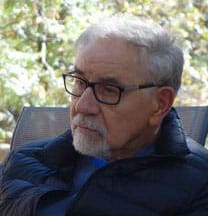The e-mail was short and to the point: Several members of my 1952-1954 class at Garrison Junior High in northwest Baltimore — Class 215 — were holding a reunion. The e-mail asked if I would be willing to come from Southern California.
The inducement was that our much-admired homeroom and English teacher, Milton “Manny” Velder, now 80, would be the honored guest.
I had no doubt that it would be wonderful to spend time with Manny Velder again, as well as all these classmates, most of whom I hadn’t seen in more than 50 years.
But it also felt dicey. Would I have to rehash my life, with its strange circuitous routes? Would I be repeating stories about the meandering path that took me from San Francisco in the 1960s to Vietnam-bound ammo ships, from yoga ashrams in India to being a kibbutz cook in Israel, from a puppet show in Rio to writing soap operas in Hollywood?
Looked at from my current vantage point — a comfortable suburban life filled with friends, family and dependable rituals — my earlier years now seem as if they were lived by someone else. Would I be able to avoid answering questions about my youthful adventures? Did I really want to avoid telling those stories?
Still full of doubt, I decided to go across the country to the reunion.
I was excited and nervous as I walked in. Shakily, I put on a name tag and looked around. Twenty-five out of 40 showed up. Some had died; others could not be reached. Some were unable to make the trip. (The only spouse of a classmate present was the hostess.)
The last time we were all together was when we were 13. Now we were all in our late 60s, which is a strange age: At this stage, some look tired and worn out, like a ball team going through the motions at the end of a losing season. But those at the reunion seemed vibrant and full of energy. Maybe it was the eyes through which I looked that made them appear that way. Perhaps it was what I wanted to see.
At one point, we gathered for a photo shoot. Arms around each other, some of us spoke movingly about what Manny Velder had meant to us.
One man, a real estate developer, talked about getting a ride home from Manny on a rainy afternoon. That day Class 215 had had a stimulating discussion about Jack London’s “Call of the Wild.” In the car, Manny told the student that it was during that give-and-take that he realized “how special teaching can be.” The developer, recalling that rainy day 55 years earlier, said that’s when he realized how special Manny was.
A family therapist, a woman, remembered a class session about World War II, an event then in the recent past. She said that Manny suggested that we consider the point of view of those who were in Hiroshima and Nagasaki when the atomic bombs fell. “With that simply stated insight,” the therapist said, “I began seeing the world differently. That’s when my true education began.”
As we spoke about him, Manny shed a tear or two, and former students on either side of him squeezed his hand.
In the end, what I’d feared — or secretly hoped for — didn’t happen: hardly anyone talked about accomplishments or professions. There was almost no mention of the adventures we’d had as adults.
Instead, we recalled the early 1950s and the largely Jewish Baltimore neighborhood of Forest Park, depicted in several Barry Levinson movies. Overwhelmed by nostalgia, we remembered the bowling alley where we hung out, the clothes we wore, hairstyles, social groupings, playing ball in the schoolyard.
And our Class 215 yearbook.
On a table were several copies of that yearbook, which we literally pasted together in the spring of 1954. Some of the photos, which had been glued on one by one, had since come loose, but some were still attached to the frayed and yellowed pages.
The foreword reads that the yearbook was compiled to “preserve the memories of two wonderful years which can be looked upon with pride in later life.”
Yes, we did look back at those years with pride. And we looked at the yearbook with pride as well. As free of cynicism as the reunion itself, that innocent document seemed to require something beyond comparing life paths.
In subsequent days, in smaller, more intimate gatherings, we would talk about ourselves: what we had done and what we had become. But not at this magical reunion of Class 215. After 54 years, it was enough to hug, chat and recall an era, a school, and a safe, quiet neighborhood — all of which had long ago disappeared.























 More news and opinions than at a Shabbat dinner, right in your inbox.
More news and opinions than at a Shabbat dinner, right in your inbox.